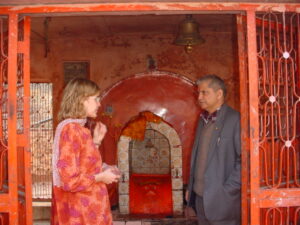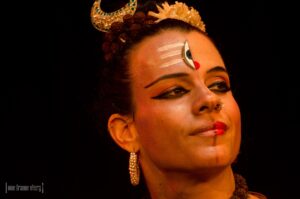18 Sep Is It Important to Know About the Context in Which Indian Wisdom Traditions (Like Ayurveda or Yoga) Exist?
by Dr. Claudia Welch
Personal Experience
When I was 19, I went to live in Benares, India to study Ayurveda… I thought. It was a year-long program through the University of Wisconsin, and the heftiest program requirement was to write a 100+ page research paper. I planned to do it on some aspect or other of Ayurveda but, upon arriving, finding a place to live, beginning to navigate life in one of the oldest, continuously occupied cities in the world and, despite having grown up in a spiritual tradition and lineage from India and been surrounded by its books, I realized I had no idea what was going on around me.
The temples, the aliveness of worship that entered into every aspect of life, the music, the art, the statues, and the festivals—oh the festivals. It was all exuberant and heartfelt and I began to feel that beginning to study Ayurveda before understanding what was going on in my neighborhood was…wrong. I couldn’t then –and not sure I can now –express why. But I changed directions and decided to study Benares winter Hindu festivals. (Just the winter ones because that was when I was going to be doing the bulk of the work and because there are more festivals than there are days of the year there and I had to start somewhere). This decision was to the chagrin of the well-meaning Western advisors of the program—who did not see how this had anything to do with Ayurveda. They felt I was not taking the program seriously. It was a perspective that reflects a common Western approach to learning: Buckle down and study your subject, efficiently.
I did the project on the festivals. While I in no way became an expert on Benares festivals, the study added more depth and insight into Ayurveda than I could then even imagine. It was one of the best decisions I ever made.
It taught me about time: the lunar cycles, the solar cycles, the importance of the stars through which the moon travels each day, the connection between deities and those stars and that moon, how festivals and rituals connect everyone—consciously or otherwise—to the cycles of seasons and months and qualities; an idea of how the planets are understood to affect terrestrial life; what to eat at different times of the year; the power, depth and role of stories that underlie and connect so much life and so many choices. When I later went on to study Ayurveda more deeply, I would see those lunar cycles, time cycles and dietary guidelines explained and enhanced from a related perspective, and would see how Ayurveda, the understanding of time and festivals were deeply intertwined. When I would go on to study Jyotisha, I would see the deep and clear connection between Jyotisha, Ayurveda and the festivals.
The study of Hindu festivals –and my amazing (Indian) advisor—Om Prakash Sharma ji– taught me more than I will probably ever fully understand, but two of the most important –and related–things were:
It taught me to take my time—a lesson that did not come easily, but has been one of the most important lessons of my life—one I continue to practice, refine and fail regularly.
And it taught me to trust detours. When I studied Sanskrit with Vagish Shastri ji, for example, there were many sessions that would be almost all stories and sparkly eyes. We’d get around to the grammar, but not…efficiently. The classes were often maybe 80% detour and 20% grammar. If evaluated in the West on his time management in classes, he…would have flunked. I loved those stories and tolerated the grammar. I have long since forgotten most of both, but the residual effect of the stories and the sparkly eyes stays with me at least as much as the grammar. It helped form my perception of the world, how it works and how all little things have meaningful origins, natures and connections that are worthy and magical to explore.
It has also connected me to others that find the mystery and magic in seeing these connections. Usually, these individuals are either Indian, or people that have studied and lived in India for a long time. Maybe this is because, outside of India we may not benefit from exposure to many other Indian knowledge traditions, or because we often tend to quickly specialize without paying much attention to context and culture.
***
So, if we are studying any one of the multitudes of Indian wisdom traditions, is it important to learn the cultural, spiritual, philosophical, artistic and scientific context from which it was born and in which it still exists?
I don’t presume to know the answer for everyone but, in my life, the answer has been a resounding, “yes.”
I feel in my bones that it is important. Maybe really important. I find it a challenge to either tidily sum up my life experiences around this, or express why it feels important, but here is an attempt to list some reasons that make sense to me–all of which relate to taking one’s time and trusting detours. I will apply this exploration to the study of Ayurveda as an example, but I have no doubt we could apply it in similar ways to the study of other sciences (vidyās), yoga, Sanskrit, Jyotiṣa, arts (kalās), or any other Indian knowledge system. Maybe these reasons will make sense to you too:
Microcosmic vs Macrocosmic Learning: Approaching an Eastern Subject in an Eastern Way
Seeing the entire universe in the Self and vice versa gives rise to true knowledge.–Caraka Saṃhitā: Śārīrasthāna:V:7
One of the tenets of many Eastern traditions is the idea that the microcosm is present in the macrocosm and the macrocosm in the microcosm. From this perspective, we can learn the whole through successful inquiry into any one part. The opposite is true as well: we can learn more about the part by exploring the whole.
It may not be that one approach is correct and the other faulty, but maybe we are more habituated to one, the other, or a combination of both approaches depending on our natures or parent culture. For example, studies have demonstrated that Western students are habituated to a more reductionist, microcosmic learning style–choosing to focus almost exclusively on their chosen subject– while almost totally ignoring the context, whereas Eastern students more traditionally engage in macrocosmic learning—devoting focus on the context in which a subject exists as well as on the subject itself.
There can be challenges with choosing either of these approaches to the exclusion of the other: When we specialize in one subject—unless we study it to the point of Enlightenment in All Things—perhaps a rare level of Mastery–we can become myopic; feeling our subject exists separate from allied subjects— not recognizing their fundamental and inherent connections.
When we focus on the whole to the exclusion of the part—again unless we study to that rare level of Mastery where All is revealed, we might get too scattered—sacrificing more thorough knowledge of our subject.
Most of us mere mortals might do well to strike a balance: study our subject deeply and also explore aspects of the whole context in which our subject exists—something Western students might do well to consciously cultivate in order to accurately learn an Eastern subject. Doing this can yield almost or actual mystical moments of glimpsing the fundamental interconnectedness and Oneness of all things. We learn that, if we go to the fundamentals of any of these allied subjects, we will find common threads or origins, like following streams to their source.
I understand that learning a little about India’s arts, sciences, teachers, texts and traditions traditionally used to be taught in India as a foundation of knowledge that, little by little, would become more specialized as the student and teacher together discovered the subject best suited the student. These days Western students tend to choose and learn Eastern subjects from a Western approach: immediately specializing (like in Ayurveda, Yoga or Sanskrit). This approach is foreign to the traditional way of learning in India, and bound to yield a different understanding and outcome.
Ayurveda itself emphasizes context. An adept practitioner will understand, for example, that you can neither effectively diagnose nor treat a stomach ache without considering the context of the whole body. In the same way, Ayurveda is not an island. It is deeply rooted in the cultural and philosophical context of ancient, as well as modern day India. Understanding the various nuances of these foundational concepts as understood from a variety of allied subjects, helps us more richly grasp the foundational principles, vocabulary and ideas central to Ayurveda.
Usually, all studies begin with a foundation. In the ancient Gurukulam system, students studied Veda, Sanskrit and other sciences and could then go on to specialize in the various vidyā-s. But now, we find ourselves specialized without having had the full foundation. It is of course impossible to have a full solid foundation like students did in the Gurukulam system. But Satsangam offers a unique space to explore, discover and contemplate on the “whole” of which we are a small part –through the expertise of life-long practitioners. I want to know something of the “whole” so that I can honour the tradition and heritage of the source of all these vidyā-s. I pay attention to experts in other arts (kalā-s) & sciences (vidyā-s) because they not only share insights from their knowledge, but they also share something intangible – the blessings and energy from each of their lineages and teachers who connect to the same “whole”. Shantala Sriramaiah of Veda Studies
Dexterity
By studying allied sciences, we acquire more therapeutic tools, which increases our dexterity—one of the four qualities of effective physicians according to the ancient texts of Ayurveda. We can then choose which tool to use, depending on which will resonate more with us or with our patients.
Ayurveda does not cover everything. The ancient sage and progenitor of Ayurveda—Sushruta—was well aware of this. He tells us quite plainly that other branches of science or philosophy are referred to, but not comprehensively taught within the treatises of Ayurveda, and that we are to refer directly to them to fill in the holes:
For explanations of truths and principles quoted from other branches (of science or philosophy) and incidentally discussed in the present work, the student is referred to expositions made by the masters (of those sciences or philosophies), since it is impossible to deal with all branches of science, etc. in a single book (and within so short a compass)… By the study of a single Shastra, a man can never catch the true import of this (Science of Medicine). Therefore, a physician should study as many allied branches (of science or philosophy) as possible. Suśruta Saṃhitā: Sūtrasthāna:IV:5-6
The foundational texts of Ayurveda, for example, do not provide a thorough explanation of how the mind or emotions work; leaving that education to the domain of the spiritual, philosophical, Jyotiṣical, yogic, artistic, and other branches of traditions and texts. I think we can all agree emotions and mental health play a huge role in the genesis and treatment of disease. To ignore the other branches of Indian arts, sciences, teachers, texts and traditions that offer in-depth guidance on emotional, mental and spiritual health would invite a significant handicap.
A student of Ayurveda will almost certainly be familiar with–and recognize the value of– concepts from ṣaḍdarśana–six philosophical systems of India–especially sāṃkhya philosophy. Familiarity with these concepts helps in comprehending the deeper principles of Ayurveda, including the concepts of elements, the mahā guṇas (sattva, rajas and tamas) and many others.
While we may be somewhat familiar with ṣaḍdarśana, we may not be as familiar with elements from other allied subjects that could lend equal value. For example, while Ayurveda recognizes six rasas—tastes or flavors, Indian performance arts recognize nine rasas—also translated as, “emotions”, and teach how to identify, embody, transmute and relate to them. Imagine how crippled we would feel without the understanding of the six tastes in Ayurveda…and then imagine how powerful it could be to add the understanding of nine more, and have a practice to emotionally and somatically work with them.
When We Better Understand Our Chosen Subject, Outcomes Improve
When we learn more about Ayurveda’s allied subjects, like in the above example of adding the nine rasas of Indian performing arts to Ayurveda’s six, it deepens, widens, enhances and shifts our perspectives and understanding of fundamental concepts like rasa, prāṇa, the mind, etc. This helps us better understand these fundamental concepts–and therefore Ayurveda itself.
We can also gain inspiration and confidence as we find perspectives from allied subjects that resonate with us.
This deeper understanding, inspiration and confidence all matter, because how we see things matters: it affects how we treat, our faith in our treatments and therefore the outcomes for our patients. There have been studies that show clearly that, while a patient’s belief in their treatment and practitioner affects the outcome of their treatment, a far more potent factor is the physician’s belief in their treatment. When a practitioner is inspired and confident in their treatment, that has an even more powerful effect on the outcome.
Cultural Appreciation & Maintenance
When we ignore Ayurveda’s cultural context, we risk cultivating a superficial understanding and application of Ayurveda’s principles. On the other hand, when we study any of India’s arts, sciences, teachers, texts and traditions, we may feel our learning is insignificant. However, our very attention to them affords them respect, and serves to keep the cultural heritage associated with Ayurveda alive. This is the –often perhaps unconscious– job of each generation.
This also has the added benefit of enhancing understanding and harmony between the East and West. As Dr. Robert Svoboda writes, “Studying more than one tradition can help non-Indian individuals better appreciate the breadth, depth, and richness of Indian culture, and can assist Indians to be better able to facilitate the sort of cross-cultural understanding and cooperation that is becoming increasingly urgent in today’s world to foster harmony.” Dr. Robert Svoboda
“Wisdom waters flow from the heavens, as rivers through mountains into a multitude of streams to meet us where we are in the One ocean. As seekers and practitioners when we are washed by the streams and rivers of a practice, we are inevitably drawn toward the Source of these waters by the blessings of teachers of the past. It is on this journey of study and exploration that we come in contact with and realize the interconnectedness of the various streams of knowledge systems shared down the ages. We honor those streams or lineages by our effort to learn about them and our attempt to understand and integrate them into our lives so that we may receive the grace of the transmission in these teachings for our own healing of body, mind, and spirit.” Nina Rao
We Would Love to Hear From You
In summary, when we take our time, trust the detours and study the cultural, spiritual, scientific, artistic and philosophical context in which Indian knowledge systems exist, we may be:
- left wonderstruck at the knowledge and wisdom that irrigates them all.
- better able to do our part to keep them alive.
- more familiar with a contextual, Eastern approach to learning.
- understand our chosen subject better.
- better respect the context, culture and very existence of our chosen subject.
- a more dexterous practitioner.
- More creative and confident with diagnosis and treatment strategies, thereby see improved outcomes.
If you have reasons you find the study or experiences around the value of studying multiple Indian knowledge systems important, really… let us know. If you do, if you’d be willing for us to share your share, let us know how you’d like to be identified (name, location, initials, anonymous, etc.)
Take Your Time. Trust the Detours.
The sentiments conveyed in this article are central to the mission of Satsangam LLC, of which Dr. Welch is a founding partner. It is also central to Satsangam’s bedrock offering: Vedic Threads– a twice-monthly, live, online, membership-based course, co-facilitated by Dr. Welch & Dr. Ramkumar, that explores the cultural, spiritual, philosophical, artistic and scientific context in which Indian wisdom traditions like Ayurveda and yoga exist. These may be useful resources for you if you are interested in Indian wisdom traditions.


